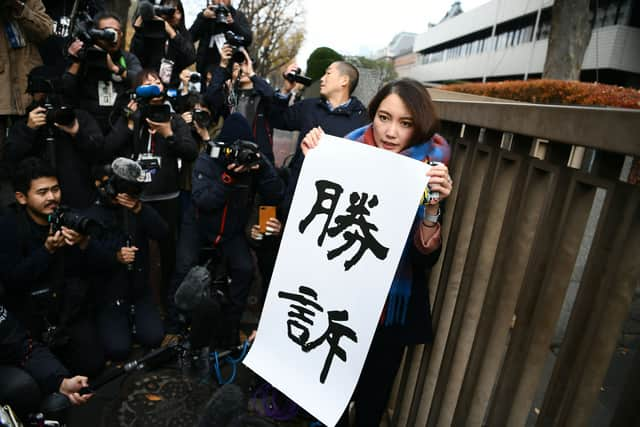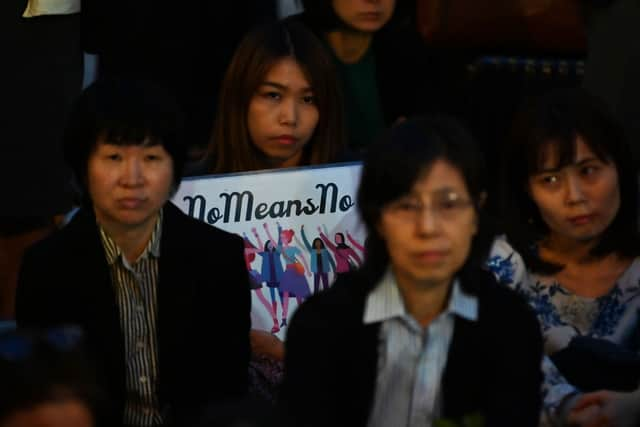Japan redefines rape and age of consent laws - new rules and history of laws in the country explained
and live on Freeview channel 276
Japan has overhauled its outdated sex crime legislation, in a step towards delivering better justice for rape and sexual assault victims.
Pressure has been on lawmakers in the country over the issue, with campaigners working for many years to push for Japan to pull its sexual assault and rape laws into line with many other countries. There have also been a number of notable cases over the past few years, which drew attention the limits of the historical legislation.
Advertisement
Hide AdAdvertisement
Hide AdCritics of the previous laws welcomed the change, which has created a new legal avenue for those who have not been "forcibly" attacked. But while the new laws have been welcomed, campaigners have continued to fight for a change in attitude around reporting such crimes in Japan.
This includes people who report sexual crimes facing stigma, with those who go public with their allegations frequently receiving online backlash and hate as a result. A 2021 survey commissioned by the Japanese government showed that half of the women polled would feel embarrassed to make such reports to the police.


What new laws have been introduced in Japan?
The new legislation has broadened the legal definition of rape from "forcible sexual intercourse" to "non-consensual sexual intercourse". In previous cases, victims of rape and sexual assault were unable to push for a prosecution - or in some cases were deterred from reporting an attack - due to the limits that the legal definition imposed on courts.
Perpetrators would be let go on the basis that there was not a struggle during an attack or a visible or audible rejection, or if there was a situation where someone would be coerced into having sex. For example, cases in which the victim was drunk or intoxicated - or frozen due to fear - would likely see the alleged perpetrator acquitted due to the court's strict reading of the law.
Advertisement
Hide AdAdvertisement
Hide AdThe new laws have set out eight scenarios in which a victim has not been able to "form, express, or fulfil an intention not to consent" that will be classed as rape. This includes being intoxicated by alcohol or drugs, subject to violence or threats, if the victim is "frightened or astonished" or if the victim is "worried" about consequences of a refusal of sexual contact - in cases of an abuse of power.
A Japanese justice ministry official told AFP earlier this year that the changes to the legal definition of rape were not intended to secure more prosecutions, but instead "hopefully make court verdicts more consistent”.


"Photo voyeurism" has also been banned, with the covert filming of sexual acts and 'upskirting' - the act of filming a person without their consent underneath their clothes - included in this ban. The statue of limitations on reporting sex crimes has also been lengthened from 10 years to 15 years.
In addition to the changed rape definition, the age of consent was also been raised in the country. Japan has historically had one of the lowest legal age of consents among developed nations at only 13. This has now been changed to 16 years old, bringing the country in line with much of the G7 cohort.
Advertisement
Hide AdAdvertisement
Hide AdThe new age of consent law will mean that any adult who engages in sexual contact with a teenager younger than 16 years will face statutory rape charges. Teenage couples with no more than five years between them will be exempt from the law if they are both over the age of 13.
What is the history of sex crime laws in Japan?
The sweeping changes marked the furthest-reaching reform of Japan's sexual assault and age of consent laws in a century. Sex crime laws were last reformed in 2017, however campaigners criticised the reforms at the time for not going far enough. The age of consent had remained at 13 since 1907.
The change to both age of consent laws and the definition of rape comes after a string of high-profile court cases in the country in 2019, in which acquittal verdicts were reached.
In one case in Fukuoka, a man was acquitted after having sex with a woman while she was inebriated. He claimed the act took place at an event where "men could easily engage in sexual behaviour", and had assumed consent because at one point the woman opened her eyes and "uttered noises". In another case in Nagoya, a father was acquitted of raping his teenage daughter repeatedly over many years, after the court doubted whether he had "completely dominated" her due to her previously going against her parent's wishes of picking a school to attend.
Advertisement
Hide AdAdvertisement
Hide AdA milestone moment in the campaign for stricter sex crime laws was in the case of Japanese journalist Shiori Ito, who became the face of Japan's Me Too movement. She broke the stigma around sexual crimes in the country by speaking publicly about an alleged experience she had with Noriyuki Yamaguchi, a prominent TV journalist.
Ms Ito claimed that Yamaguchi raped her while she was intoxicated, an allegation which the TV journalist continues to deny. She also criticised the restrictive reporting process for a victim of sexual assault in Japan, explaining that she could not source information on how to obtain rape kits without a mandatory interview and claimed she was discouraged from making an official police report against Yamaguchi out of fear of losing her career.
Unable to pursue a criminal case, Ms Ito filed a civil sexual assault lawsuit against Yamaguchi in 2017. In December 2019, a Tokyo court ruled in favour of Ms Ito, with Yamaguchi ordered to pay 3.3million yen (around £18,000) in damages. The case gained international attention for its focus on Japan's approach to sex crimes in a criminal court.
Comment Guidelines
National World encourages reader discussion on our stories. User feedback, insights and back-and-forth exchanges add a rich layer of context to reporting. Please review our Community Guidelines before commenting.
